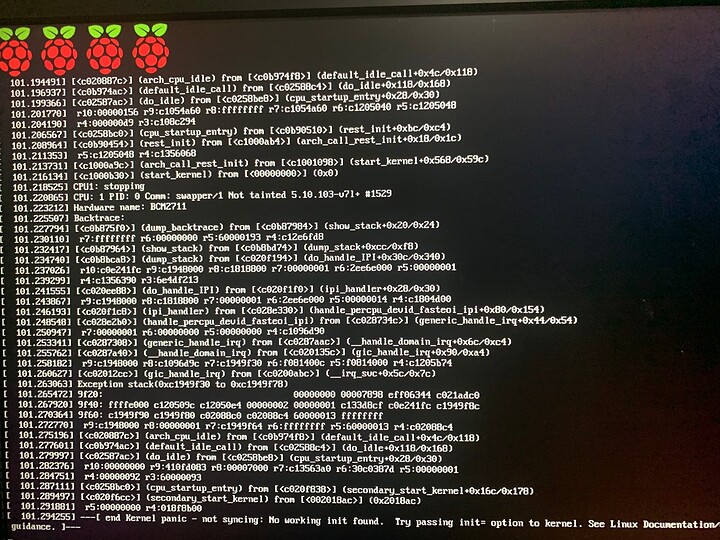Hi Biky, appreciate your response.
I went through this again. Iterated 4 of 5 times again change my config on the exports and also trying different /etc/fstab configs. I always end up with a kernel panic.
This is my current export config now:
/nfs/pi-pxe x.x.x.x/x(rw,sync,no_root_squash,no_subtree_check)
/nfs/pi-tftpboot x.x.x.x/x(rw,sync,no_root_squash,no_subtree_check)
I also noticed an error with the RCP service:Sep 14 13:26:45 nfs-server rpcbind[56535]: cannot open file = /run/rpcbind/rpcbind.xdr for writing
Sep 14 13:26:45 nfs-server rpcbind[56535]: cannot save any registration
Sep 14 13:26:45 nfs-server rpcbind[56535]: cannot open file = /run/rpcbind/portmap.xdr for writing
Sep 14 13:26:45 nfs-server rpcbind[56535]: cannot save any registration
I was able to fix these by creating the files it was complaining about, and then also changing the permissions of /run/rpcbind recursively with this command:
chown -R rpc:rpc /run/rpcbind
I also made sure selinux is not blocking anything but setting things up in permissive mode.
These are my TFTP logs at boot when the PI boots up:
Sep 14 13:33:06 nfs-server in.tftpd[56626]: tftp: client does not accept options
Sep 14 13:33:06 nfs-server in.tftpd[56627]: Client ::ffff:192.168.31.40 finished f024980d/config.txt
Sep 14 13:33:07 nfs-server in.tftpd[56631]: Client ::ffff:192.168.31.40 finished f024980d/start4.elf
Sep 14 13:33:07 nfs-server in.tftpd[56632]: Client ::ffff:192.168.31.40 finished f024980d/fixup4.dat
Sep 14 13:33:08 nfs-server in.tftpd[56635]: Client ::ffff:192.168.31.40 finished f024980d/config.txt
Sep 14 13:33:08 nfs-server in.tftpd[56639]: Client ::ffff:192.168.31.40 finished f024980d/config.txt
Sep 14 13:33:09 nfs-server in.tftpd[56642]: Client ::ffff:192.168.31.40 finished f024980d/bcm2711-rpi-4-b.dtb
Sep 14 13:33:09 nfs-server in.tftpd[56644]: Client ::ffff:192.168.31.40 finished f024980d/overlays/overlay_map.dtb
Sep 14 13:33:09 nfs-server in.tftpd[56646]: Client ::ffff:192.168.31.40 finished f024980d/config.txt
Sep 14 13:33:09 nfs-server in.tftpd[56648]: Client ::ffff:192.168.31.40 finished f024980d/overlays/vc4-fkms-v3d-pi4.dtbo
Sep 14 13:33:10 nfs-server in.tftpd[56650]: Client ::ffff:192.168.31.40 finished f024980d/cmdline.txt
Sep 14 13:33:12 nfs-server in.tftpd[56663]: Client ::ffff:192.168.31.40 finished f024980d/kernel7l.img
This is my cmdline.txt from my NFS/TFTP share:
console=serial0,115200 console=tty1 root=/dev/nfs nfsroot=192.168.31.68:/nfs/pi-pxe/rpi001 rw ip=dhcp elevator=deadline rootwait
This is my fstab on the NFS server, full path /nfs/pi-pxe/rpi001/etc/fstab. You will notice that in my latest update I commented out the /boot mount, but I’ve tried it both ways. I’ve also played around with the fsck option in both the /boot and / mount:
proc /proc proc defaults 0 0
#PARTUUID=7daedbb9-01 /boot vfat defaults 0 2
#PARTUUID=7daedbb9-02 / ext4 defaults,noatime 0 1
#192.168.31.68:/nfs/rpi-tftpboot/f024980d /boot nfs defaults 0 0
192.168.31.68:/nfs/rpi-pxe/rpi001 / nfs defaults,noatime 0 0
# a swapfile is not a swap partition, no line here
# use dphys-swapfile swap[on|off] for that
These are my nfs and rcp packages:
libtirpc-1.3.2-1.0.1.el9.x86_64
libnfsidmap-2.5.4-10.el9.x86_64
rpcbind-1.2.6-2.el9.x86_64
nfs-utils-2.5.4-10.el9.x86_64
sssd-nfs-idmap-2.6.2-4.0.2.el9_0.1.x86_64
This is my kernel version on my nfs/tftp server:
Linux 5.15.0-1.43.4.2.el9uek.x86_64 #2 SMP Wed Aug 17 14:50:30 PDT 2022 x86_64 x86_64 x86_64 GNU/Linux
And this is my distro version:
Red Hat Enterprise Linux release 9.0 (Plow)
Oracle Linux Server release 9.0
The reason I’m trying oracle linux is because I also wanted to test kernel updates without reboots, with ksplice (Zero downtime updates for Oracle Linux). But that’s just a side note in case anyone is wondering why I’m using oracle linux.
I’m still getting the kernel panics, willing to try more things or provide more logs and information if anyone else has ideas. Thanks again!
